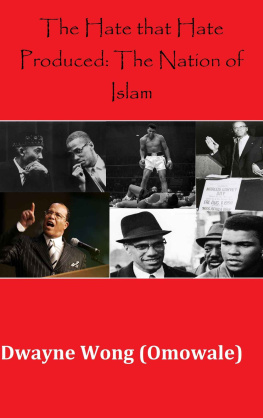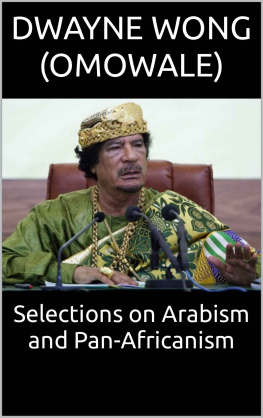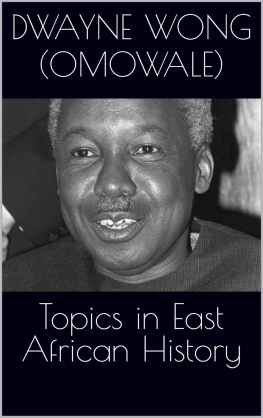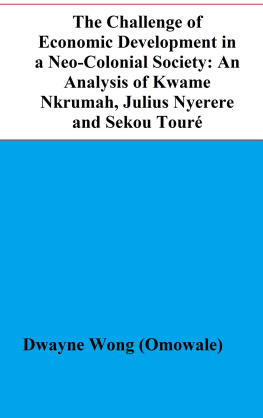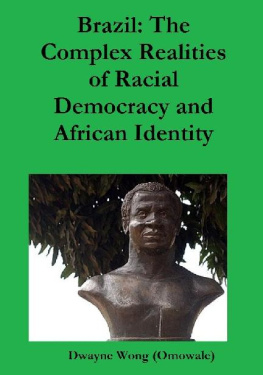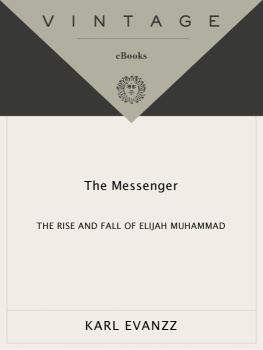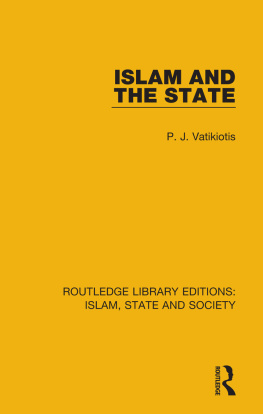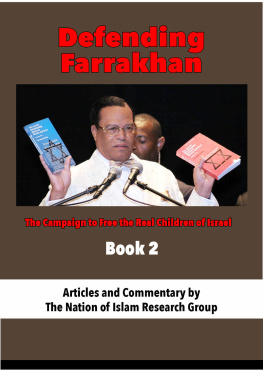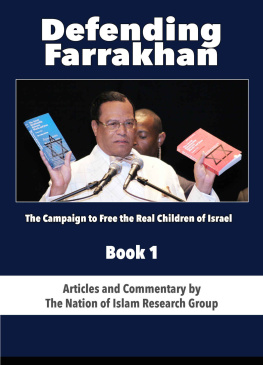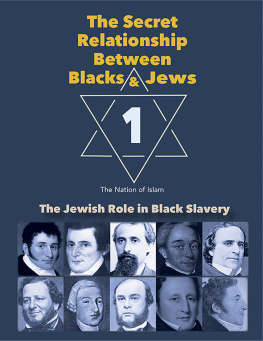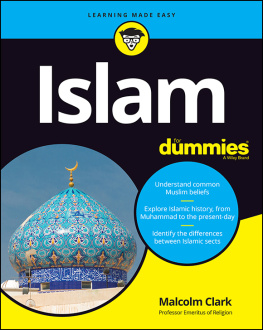The Hate that Hate Produced: The Nationof Islam
DwayneWong (Omowale)
Copyright 2016 Dwayne Wong (Omowale)
Allrights reserved.
CONTENTS
| Malcolm X: The Man and His Contribution to the Pan-African Struggle |
| The Strengths and Weaknesses of the Nation of Islam |
| A Critical Assessment of Muhammad Ali as a Political Figure |
| A Review of the Hate That Hate Produced |
Malcolm X: TheMan and His Contribution to the Pan-African Struggle
Hewas one of the most fascinating and charming men I have ever met, and neverhesitated to take his attractiveness and beat you to death with it. Yet hisirritation, though painful to us, was most salutary. He would make you angry ashell, but he would also make you proud. It was impossible to remain defensiveand apologetic about being a Negro in his presence. He wouldnt let you. Andyou always left his presence with the sneaky suspicion that maybe, after all,you were a man!
-OssieDavis
He was saying something over and above that of any other leaderof that day. While the other leaders were begging for entry into the house oftheir oppressor, he was telling you to build your own house.
-John Henrik Clarke
Now, everybody talks about Malcolm like they lovedhim so much when he was alive, but thats a lie and they know it. When Malcolmwas killed, the majority of negroes reacted the same way white people did. Theywere glad, because they had been told that Malcolm was going around stirring uptrouble.
-H. Rap Brown
We werent accustomed to being told that we were devils and thatwe were oppressors up here in our wonderful northern cities. He was speakingfor a silent mass of black people and sang it out front on the devils ownairwaves, and that was an act of war.
-Peter Goldman
I came away from that rally feeling that with him, once you heardhim speak, you never went back to where you were before. You had toeven if youkept your position, you had to rethink it.
-Peter Bailey
He expelled fear for African Americans. Hesaid, I will speak out loud what weve been thinking, and he said, Youllsee. People will hear it and they will not do anything to us necessarily, Ok , but I will now speak it for the masses of people. Whenhe said it in a very strong fashion, in this very manly fashion, in thisfashion that says, I am not afraid to say what youve been thinking all theseyears, thats why we loved him. He said it out loud, not behind closed doors.He took on America for us.
-SoniaSanchez
Ilook at my watch or I show up late somewhere and I can hear Malcolm talkingabout not trusting a person who doesnt wear a watch and who is careless withtime. And he first said that to me when I was 14 years old, and I hear it in myear today like hes still there, saying it.
-Sharon10X
Iremember another stoopful of women alongside the doorof a small grocery store where I had gone for something, leaving Malcolm Xtalking across the street. As I came out of the store, one woman was excitedlydescribing for the rest a Malcolm X lecture she had heard in Mosque Number 7one Sunday. Oooooh , he burnt that white man, burnthim up, chile chile , hetold us we descendin from black kings an queens Lawd , I didnt know it! Another woman asked, You believethat? and the first vehemently responded, Yes, I do!
-Alex Haley
Noman in our time aroused fear and hatred in the white man as did Malcolm,because in him the white man sensed an implacable foe who could not be had forany pricea man unreservedly committed to the cause of liberating the black manin American society rather than integrating the black man into that society.
-M.S. Handler
Malcolm X was a polarizing figure of thecivil rights movement of the 1950s and 1960s. For some he was an uncompressingchampion of African American liberation. He was a deeply spiritual anddedicated man who gave his life for a cause. To others Malcolm was a demagogueand a racist. They see him as a promoter of violence and division. A man whowas of no value to the struggle for African American liberation. As theabovementioned quotes demonstrate, however, for better or for worse, Malcolmhas had a lasting impact on the African struggle; not only the African strugglein the United States, but the global African struggle. Malcolm was, like MarcusGarvey and many others before him, a Pan-Africanist and a man who saw thestruggle of African Americans as being tied to the larger struggle for Africanfreedom. More so than African freedom, Malcolm was a voice for all oppressedpeople around the world.
Malcolms story is also unique in thatMalcolm rose up from the lowest segment of the population. Malcolm emerged fromthe drugs, crime, and hustling of the ghettos. Despite Malcolms brilliantanalysis of the African problem in the United States, he was not a collegeeducated person; he educated himself in jail. When asked what his alma materwas, Malcolm simply responded, Books.
Malcolms legacy is as much a legacy ofstruggle as it is a legacy of redemption. He was redeemed from ignorance,crime, addiction, drunkenness, self-hatred, and everything else that hasafflicted black people. He then made it his lifes duty to redeem others. Thismade Malcolm beloved, as well as feared. The last part must be understood because many of those who later spokewith love of Malcolm had actually feared him initially.
Sonia Sanchez recalled:
When I first saw Malcolm on atelevision, he scared me also. Immediately the family said, Turn off thattelevision. That man is saying stuff you aint supposed to hear, so of course we did. But alwaysyou know when the sun comesin the window and you kind of jump up to get it, to close the blinds or pulldown the shade, but before you do that, the sun comes in? Well, before eachtime wed turn the television off, a little sun came in.
Malcolm not only revealed Americasdeep-seated racial division and hypocrisy, he also exposed the class divisionwithin black America. Malcolm was not only uncompromising in his attacks onwhite racism, he also attacked the African apologists who defended that racism.Ossie Davis said of Malcolm : He also knew that every Negro who did not challenge on the spotevery instance of racism, overt or covert, committed against him and hispeople, who chose instead to swallow his spit and go on smiling, was an UncleTom and a traitor, without balls or guts, or any other commonly acceptedaspects of manhood!
Malcolm accused Martin Luther King ofbeing a religious Uncle Tom who taught black people to be defenseless. ThoughMalcolm said that the NationalAssociation for the Advancement of Colored People (NAACP) was doingtheir best to correct the issues in the United States, he also critiqued theNAACP for being in existence for 54 years and never electing a blackpresidentthe NAACP would not elect a black president until after Malcolmsmurder in 1965. The stance of Elijah Muhammad and the Nation of Islam was thatthey were still willing to work with the NAACP or any other organization toimprove the conditions of black people, as long as it did not conflict withtheir religious beliefs; but Malcolm was fully aware that these organizationshad failed to empower black people in any meaningful sense.
T here was also noshortage of criticisms of Malcolm X and the Nation of Islam by groups such asthe NAACP and the Urban League. Thurgood Marshall was also critical of theNation of Islam, saying of them that they were a bunch of thugs organized fromprisons and jails and financed, I am sure, by some Arab group. (Malcolm wasnot very fond of Marshall either) One of the great demonstrations of MartinLuther Kings self-control and humility was that despite Malcolms harshattacks on him, King always refused to criticize or attack Malcolm in return.He also refused to publicly debate Malcolm. The closest King may have ever cometo putting Malcolm down was when he stated that he never considered Malcolm tobe an outstanding civil rights leader and that Malcolm did not have a solutionto the problem, though King maintained that he personally liked Malcolm.
Next page
